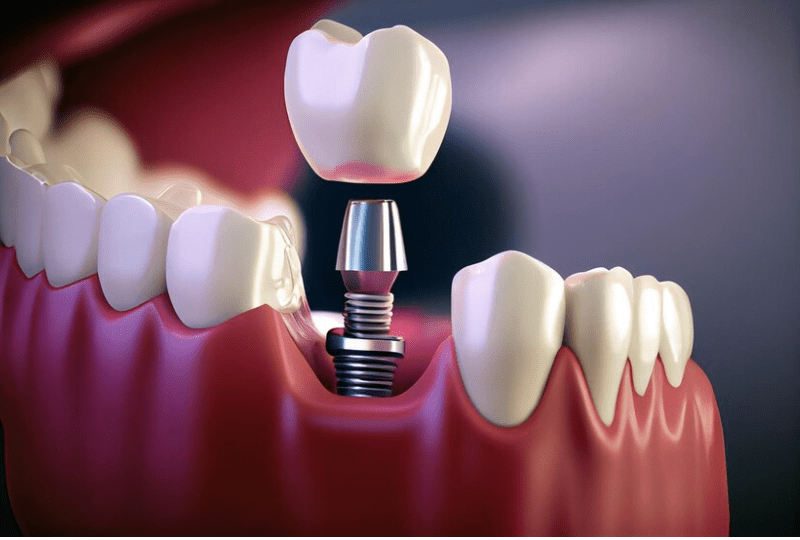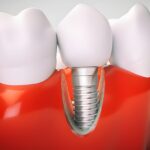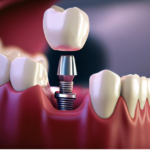Dental implants are an increasingly popular solution for tooth replacement, known for their durability, functionality, and natural appearance. The success rate of dental implants UK is a crucial consideration for anyone thinking about undergoing this procedure. This article provides a comprehensive overview of the factors influencing the success rate of dental implants, the statistical success rates, potential complications, and the importance of proper care. When considering dental implants, consulting a reputable implantologist in the UK can significantly enhance the chances of success.
Understanding Dental Implants
What Are Dental Implants?
Dental implants are artificial tooth roots, typically made from titanium, that are surgically inserted into the jawbone to support replacement teeth such as crowns, bridges, or dentures. The implants fuse with the jawbone through a process called osseointegration, providing a stable and durable foundation for the artificial teeth. This integration ensures that the implants function similarly to natural teeth, offering a permanent solution to tooth loss.
Why Choose Dental Implants?
Dental implants offer numerous benefits, including improved aesthetics, enhanced chewing ability, and prevention of bone loss. Unlike dentures, implants do not slip or cause discomfort, providing a more natural and secure fit. These advantages make dental implants a preferred choice for many individuals seeking long-term solutions for missing teeth.
Statistical Success Rates of Dental Implants
General Success Rates
Dental implants have a high success rate, with studies indicating an overall success rate of approximately 95-98% over a 10-year period. This success rate reflects the reliability and effectiveness of dental implants as a tooth replacement option. Factors such as advancements in implant technology and surgical techniques have contributed to these high success rates.
Success Rates by Jaw Location
The success rate of dental implants can vary depending on their location in the mouth. Implants placed in the lower jaw (mandible) tend to have slightly higher success rates compared to those in the upper jaw (maxilla). This difference is primarily due to the denser bone structure in the lower jaw, which provides a more stable foundation for the implants. However, with proper care and techniques, implants in both locations can achieve high success rates.
Long-Term Success Rates
Long-term studies have shown that dental implants can last for decades with proper care. Research indicates that implants have a success rate of 90-95% after 15 years. These findings highlight the longevity and durability of dental implants, making them a worthwhile investment for individuals seeking permanent tooth replacement solutions.
Factors Influencing the Success Rate of Dental Implants
Bone Quality and Quantity
The quality and quantity of the jawbone play a critical role in the success of dental implants. Sufficient bone density and volume are essential for the implant to properly integrate with the jawbone. Patients with inadequate bone may require bone grafting procedures to enhance the bone structure before implant placement.
Oral Hygiene
Maintaining excellent oral hygiene is crucial for the success of dental implants. Regular brushing, flossing, and professional cleanings help prevent infections such as peri-implantitis, which can compromise the stability and longevity of the implants. Patients must commit to good oral hygiene practices to ensure the long-term success of their implants.
Overall Health
A patient’s overall health significantly impacts the success rate of dental implants. Conditions such as diabetes, osteoporosis, or autoimmune diseases can affect the healing process and osseointegration. Additionally, smoking has been shown to decrease the success rate of dental implants due to its negative effects on blood flow and healing. A thorough medical evaluation and management of underlying health conditions are essential for successful implant outcomes.
Experience of the Implantologist
The skill and experience of the implantologist play a pivotal role in the success of dental implants. Choosing a qualified and experienced implantologist in the UK can greatly increase the likelihood of a successful implant procedure. An experienced implantologist can accurately assess the patient’s suitability for implants, plan the surgery meticulously, and handle any complications that may arise.
Potential Complications and How to Avoid Them
Peri-Implantitis
Peri-implantitis is an infection that affects the tissues surrounding the dental implant, leading to inflammation and bone loss. It is primarily caused by poor oral hygiene and can compromise the stability of the implant. Regular dental check-ups and proper oral care are essential to prevent peri-implantitis.
Implant Failure
Although rare, implant failure can occur if the implant does not properly integrate with the jawbone. Factors such as insufficient bone density, improper placement, or infection can contribute to implant failure. Pre-surgical assessments and following post-operative care instructions are crucial to minimize the risk of implant failure.
Nerve Damage
Nerve damage is a potential complication that can occur during the implant placement procedure. It can result in numbness, tingling, or pain in the surrounding tissues. Ensuring the implantologist uses advanced imaging techniques and precise surgical planning can help avoid nerve damage.
Sinus Issues
For implants placed in the upper jaw, there is a risk of sinus perforation. This complication can be avoided through careful planning and the use of bone grafting techniques to provide adequate bone support for the implant.
Importance of Post-Operative Care
Immediate Post-Operative Care
Proper care immediately after the implant surgery is crucial for successful healing and integration. Patients should follow their implantologist’s instructions, which may include using antiseptic mouth rinses, taking prescribed medications, and avoiding certain foods and activities that could disrupt the healing process.
Long-Term Maintenance
Long-term maintenance of dental implants involves regular dental visits for professional cleanings and check-ups. These visits allow the dentist to monitor the health of the implants and surrounding tissues, detect any early signs of complications, and provide necessary treatments to ensure the longevity of the implants.
Lifestyle Considerations
Patients should adopt a healthy lifestyle to support the success of their dental implants. This includes quitting smoking, limiting alcohol consumption, and maintaining a balanced diet rich in nutrients that promote oral health. These lifestyle changes can significantly enhance the longevity and success of dental implants.
High Success Rate of Dental Implants
Dental implants offer a reliable and long-lasting solution for tooth replacement, with success rates ranging from 90-98% over the long term. Factors such as bone quality, oral hygiene, overall health, and the experience of the implantologist significantly influence the success of dental implants. By addressing these factors and following proper care instructions, patients can enjoy the many benefits of dental implants for decades.
Trust the Leading Implantologist Dental Group in Europe for Your Implant Needs
If you are considering dental implantologist UK, choosing a reputable and experienced provider is essential for achieving the best outcomes. The Leading Implantologist Dental Group in Europe offers expert care, advanced techniques, and personalized treatment plans to ensure successful implant procedures.
Contact Us Today
Reach out to the Leading Implantologist Dental Group in Europe to schedule your consultation. Our team of skilled professionals is dedicated to providing the highest standards of care, ensuring that your journey to a restored smile is smooth and successful. Whether you need an initial assessment or advanced implant treatment, we are here to guide you every step of the way. Invest in your oral health with confidence, knowing that you are in the hands of the best implantologists in the industry. Your new smile awaits with the Leading Implantologist Dental Group in Europe.




